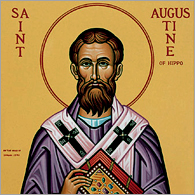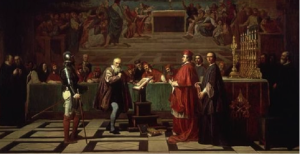In the Galileo case we need to consider three important documents in light of a strict canonical interpretation. First, there is a 1616 report issued by a group of theologians in response to a commission by the Holy Office. This document was never promulgated and is not magisterial. It was informational and advisory. The Pope acted upon this document by having Galileo personally warned by Cardinal Bellarmine not to teach Copernicanism as a thesis anymore. We will see that this document was cited, but not adopted by the 1633 decree against Galileo. But this does not elevate the authority of the document itself and it remains non-magisterial.
Articles by David Palm copyright © 2014-20
[Links to other sites in support of specific ideas do not necessarily imply agreement with or endorsement of any view expressed thereon.]
Categories
-
Recent Articles
- What’s New?
- When Is an Apple Not an Apple?
- For the Fifth Time – The Roman Catechism Does Not Teach Geocentrism
- St. Maximilian Kolbe Was No Geocentrist
- Robert Sungenis: Incompetent in Physics
- Geocentrist Dodges Pioneer Challenge, Part 2
- Top Geocentrist Fails Pioneer Challenge
- Geocentrism and Stellar Aberration: Illuminating the Earth’s Motion
- Paranoid Much? The “Principled” Response to Flat Earth Geocentrism
- What is the Single Best Argument Against Geocentrism?
- A Reader Thanks Geocentrism Debunked
- Getting on the Wrong Wavelength: More Basic Physics Blunders by the Geocentrists
- Flat Earth has Global Appeal while Ball Earth Geocentrism is Flat-lining
- Why Geocentrism is “Junk Science”
- Growing by Leaps and Bounds?
- General Relativity Leaves No Room for Strict Geocentrism
- Equivocation, Thy Name is Geocentrism
- Sungenis Tries to Proposition His Readers
- Dark Matter Illuminates Geocentric Double Standards
- St. Basil “Dogmatic” on Geocentrism? Nope!
- Aether, Springs, and Light: Physics Blunders in Galileo Was Wrong
- Sungenis vs. Pope Benedict XV: Was Dante a Marginal Catholic?
- It Really Is That Simple: Geocentrism Lacks Basic Evidence
- Robert Sungenis, Physics Major?
- Sungenis Fails the CMB Alignment Challenge….Twice
- Conspiracies — Yeah, That Sounds Reasonable
- Sungenis Followers Double Down
- The “Simple” and “Scary” Mindset of Robert Sungenis
- Karl Keating’s “The New Geocentrists”
- Geocentrism: Tempest in a Teapot or Theological Shipwreck?
- Will the New Geocentrists take The CMB Alignment Challenge?
- Yes, the CMB Misalignments Are a Problem for the New Geocentrists
Archives

- "It not infrequently happens that something about the earth, about the sky, about other elements of this world, about the motion and rotation or even the magnitude and distances of the stars, about definite eclipses of the sun and moon, . . . and of other such things, may be known with the greatest certainty by reasoning or by experience, even by one who is not a Christian. It is too disgraceful and ruinous, though, and greatly to be avoided, that he should hear a Christian speaking so idiotically on these matters, and as if in accord with Christian writings, that he might say that he could scarcely keep from laughing when he saw how totally in error they are." –St. Augustine, The Literal Interpretation of Genesis 1:19–20, Chapt. 19

-
"No; that argument about man looking mean and trivial in the face of the physical universe has never terrified me at all, because it is a merely sentimental argument, and not a rational one in any sense or degree.
I might be physically terrified of a man fifty feet high if I saw him walking about my garden, but even in my terror I should have no reason for supposing that he was vitally more important than I am, or higher in the scale of being, or nearer to God, or nearer to whatever is the truth. The sentiment of an overpowering cosmos is a babyish and hysterical sentiment, though a very human and natural one.
But if we are seriously debating whether man is the moral center of this world, then he is no more morally dwarfed by the fact that his is not the largest star than by the fact that he is not the largest mammal.
Unless it can be maintained a priori that Providence must put the largest soul in the largest body, and must make the physical and moral center the same, 'the vertigo of the infinite' has no more spiritual value than the vertigo of a ladder or the vertigo of a balloon." (G.K. Chesterton, "Man in the Cosmos," The Illustrated London News, 19 February 1910)

- "The insignificance of Earth was as much a commonplace to Boethius, King Alfred, Dante, and Chaucer as it is to Mr. H.G. Wells or Professor Haldane. Statements to the contrary in modern books are due to ignorance. . . . the spatial insignificance of Earth, [was] asserted by Christian philosophers, sung by Christian poets, and commented on by Christian moralists for some fifteen centuries, without the slightest suspicion that it conflicted with their theology" (C. S. Lewis, Miracles, 78).

